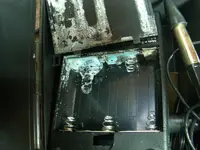I wonder if that was the actual mistake...? Maybe it sealed the moisture *in* instead of out? Either way, that was a tough pill to swallow... sorry to hear about it, and the ugly bill to follow... here's hoping you recoup your losses quickly with your newly-repaired machine!
Doesn't really matter.
The chemistry inside a battery changes as it is discharged - this is the root of the problem.
Batteries will eventually discharge themselves even when not used (i.e., in a drawer), but it can take a long time.
When installed in equipment, there is usually at least some additional parasitic drain of current (often, whatever responds to the on/off switch of the device, or a realtime clock, etc..) The equipment is at highest risk when the battery is nearly discharged because by that time, enough hydrogen or other gas has accumulated within the battery to rupture the case. When the case or internal pressure seals rupture, the battery electrolyte can escape and damage your device. (Typically, this is the white crud you see on the terminals - i.e., potassium carbonate.)
In addition to this, some cheaper brand batteries simply use cardboard cases and do not have (what I would call) appropriate pressure seals.
With these, you case itself will leak! Forget the endcap pressure seals (if they even exist?).
These batteries can get "mushy" to the point you may even be able to bend them with light pressure.
If you're going to use bargain-brand batteries (including non-alkaline ones like the old-style zinc-carbon) then don't "help" the process along by allowing the cardboard battery cases to get wet via external means.
Remember: All batteries leak (technically, not true - but true enough for our purposes here).
They will tend to leak more, and start leaking sooner, if the batteries are already significantly discharged when you put your device in "long-term" storage. (If not discharged, than the internal chemistry hasn't changed that much, and hence less gas build-up to cause the seals to rupture.)
Do yourself a favor and alway buy good quality alkaline batteries. Some brands even offer leak-proof guarantees.
And if you're going to put something away without further use for long enough to kill whatever power might be left in the batteries - then definitely remove them from the device first. If you don't know the remaining charge, or don't know really how long the device might sit until the next use - the safe play is to remove the batteries.
I try to make it a point at least once a year to check everything I own that has a battery.
If at that time I can't remember the last time I used the device, out come the batteries!



 Yep, did that too! Still haven't cleaned it out yet. I have the wall adapter I use for now....
Yep, did that too! Still haven't cleaned it out yet. I have the wall adapter I use for now....
